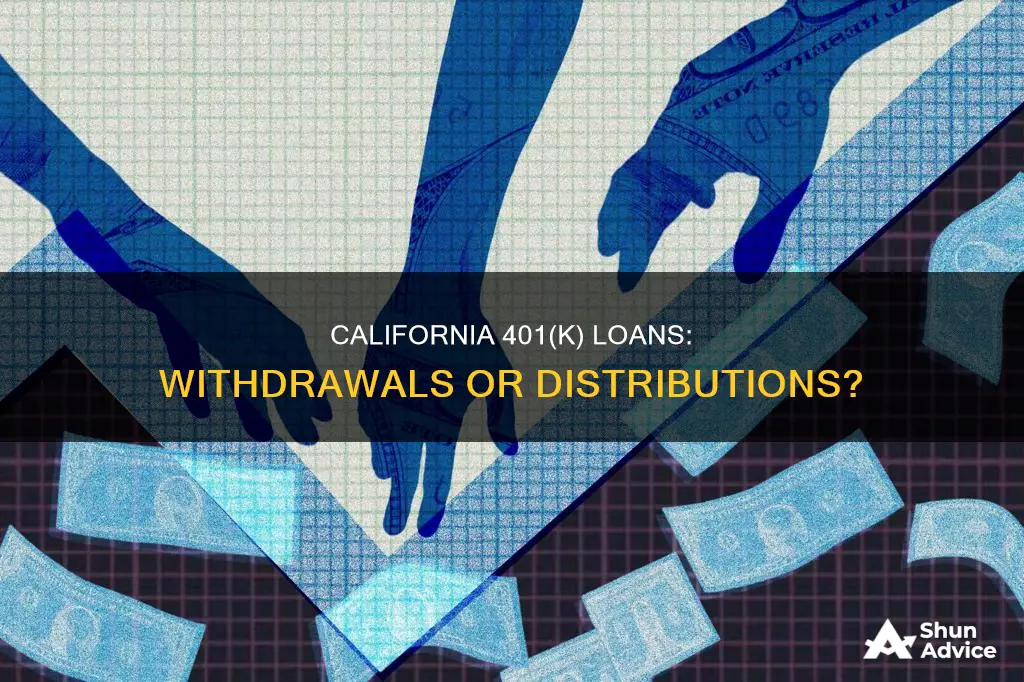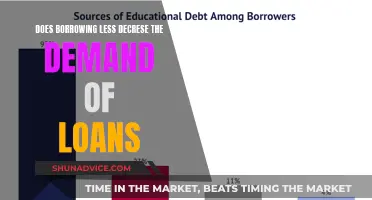
In California, retirement savings vehicles like 401(k) plans are a popular option for employees to save for their non-working years. While these plans are intended for long-term savings, life events may necessitate accessing funds early. This can be done through a 401(k) loan or withdrawal (also called a distribution). If an individual defaults on their 401(k) loan, the unpaid balance is considered a distribution, which may result in taxes and penalties. Thus, understanding the implications of a 401(k) loan default as a distribution is crucial for Californians considering early access to their retirement savings.
What You'll Learn

Leaving a job with an unpaid 401(k) loan
Understanding the Impact of Leaving
When you leave a job with an outstanding 401(k) loan, your employer may require immediate repayment of the loan. Many company plans have provisions to deter employees from leaving, such as demanding loan repayment within a short time frame, often 60 days. If you are unable to repay the loan promptly, it is considered defaulted or offset. This means the unpaid balance is treated as a distribution, reducing your 401(k) account balance.
Tax Implications
The loan offset amount is typically subject to ordinary income taxes. Additionally, if you are under the age of 59½, you may also face a 10% early withdrawal penalty. These taxes and penalties can significantly impact your overall financial situation. However, it's important to consult with a tax professional, as there may be exceptions or extensions available.
Options to Consider
To avoid the tax consequences of a loan offset, you have a few options:
- Rollover to a New Plan: You can roll over the loan offset amount to an individual retirement account (IRA) or another eligible plan, such as a new employer's 401(k) plan, if permitted. This option allows you to avoid immediate tax consequences and continue growing your retirement savings.
- Repayment with a New Loan: If your new employer offers a 401(k) plan, you may be able to take out a new loan to repay the old one. However, this approach should be carefully considered, as it may come with its own set of pros and cons.
- Spouse's 401(k) Loan: If your spouse has access to a 401(k) loan through their employment, this could be an option to explore for loan repayment.
- Roth IRA Withdrawal: While not ideal, you can withdraw contributions (not earnings) from a Roth IRA at any time without penalty. However, you won't be able to pay this money back later, so consider this option carefully.
Planning Ahead
If you anticipate leaving your job and have an outstanding 401(k) loan, it's essential to plan ahead. Review your plan's summary description to understand the specific requirements and deadlines for loan repayment upon termination. Discussing your situation with a financial advisor or tax professional can help you navigate the complexities and make the most informed decisions.
Beto's College Loans: What Does He Owe?
You may want to see also

Defaulting on a 401(k) loan
When a 401(k) loan goes into default, the unpaid balance is considered a distribution, often referred to as a "deemed distribution" or a "loan offset amount." This distribution is then subject to various taxes and penalties. Firstly, the distributed amount is generally included in the individual's gross income for the year, resulting in additional income tax liability. Secondly, if the individual is under the age of 59 1/2, they may also be subject to an early withdrawal penalty of 10% on the distributed amount. These taxes and penalties can significantly reduce the individual's retirement savings and take a substantial chunk of their income.
To avoid the tax implications of a default, individuals have the option to repay the loan or roll over the distributed amount to a new employer's 401(k) plan or an IRA. However, this must be done by the federal income tax filing deadline for the year in which the default occurred, including any extensions. It's worth noting that taking a loan or withdrawal from a 401(k) plan can interrupt the potential for tax-deferred compounding growth on those funds.
In addition to the financial consequences, defaulting on a 401(k) loan can also impact an individual's future borrowing options and creditworthiness. A default may affect their ability to obtain loans in the future, as it can reflect negatively on their credit report and lower their credit score. It's always recommended to consult a financial advisor or tax professional before making any decisions regarding 401(k) loans or withdrawals to fully understand the short-term and long-term implications.
While it may be tempting to borrow from your 401(k) in times of financial need, it's crucial to carefully consider all alternatives first. Explore other potential sources of funds, such as personal savings, loans from family or friends, or traditional bank loans. Weigh the pros and cons of each option, including the associated costs, repayment terms, and potential impact on your financial future. Remember, every individual's situation is unique, and what works for someone else may not be the best choice for you.
Binghamton University's Perkins Loan Participation Explained
You may want to see also

401(k) hardship withdrawals
A 401(k) plan may allow you to borrow from your account balance or take a withdrawal (also known as a distribution). However, it is important to consider the costly implications of doing so, as you will be interrupting the potential for the funds to grow through tax-deferred compounding.
In the case of a 401(k) loan, you generally have up to five years to repay it. However, if you leave or lose your job before the loan is repaid, you may have to pay back the remaining balance quickly. If you are unable to do so, the loan will go into default, and the unpaid balance will be considered a distribution, or a loan offset amount. This may result in federal and state income taxes, as well as an additional 10% federal income tax if you are under 59 and a half years old, unless an exception applies.
A hardship withdrawal from a 401(k) is an option for those facing immediate and heavy financial needs, such as medical expenses, funeral costs, tuition fees, or expenses to prevent foreclosure or eviction. While you are not required to pay back hardship withdrawals, they are typically taxed as ordinary income, and you may need to pay a 10% early withdrawal penalty if you are under 59 and a half years old. To initiate a hardship withdrawal, you will need to determine if your 401(k) plan permits it and then contact your plan sponsor, who may be a human resources representative or a financial advisor.
It is important to carefully consider your options and consult a financial advisor before deciding to take out a loan or withdrawal from your 401(k) plan, as there may be other sources of funds available to you.
Explore Microfilm: BPL's Lending Options
You may want to see also

401(k) loans vs. mortgages
A 401(k) loan can be a quick and easy solution to fund a down payment on a home, especially if you have more money in that account than anywhere else. However, financial planners advise against borrowing from your retirement savings, and there are several factors to consider when comparing 401(k) loans with mortgages. Firstly, a 401(k) loan does not impact your mortgage or credit rating. It also won't affect the rates and terms of your current mortgage or the application process for a new one. However, if you fail to repay a 401(k) loan, the funds become subject to taxes, and there may be an early withdrawal penalty.
A 401(k) loan can provide short-term liquidity, allowing you to access your retirement savings. It essentially means borrowing from and paying interest to yourself. The loan generally doesn't count as debt when lenders calculate your debt-to-income ratio, and it can be used for a down payment on a home. However, it's important to repay the loan quickly to maximise the benefits of compound interest. Additionally, the loan payments will be deducted from your salary, so ensure that you can afford the repayments without compromising your lifestyle or resorting to credit card debt.
On the other hand, a mortgage provides access to a more substantial sum of money, which can be beneficial if you need a large amount for a down payment on a home. While a mortgage may come with a lower interest rate than a 401(k) loan, it is a long-term commitment that can take several years to repay. It is crucial to consider the interest accrued over time and how it fits into your overall financial plan.
When deciding between a 401(k) loan and a mortgage, it's essential to understand the risks and alternatives. For example, a Home Equity Line of Credit (HELOC) can be a more flexible option, allowing you to borrow, repay, and reborrow during the draw period. Additionally, you may want to explore alternatives such as low-down-payment mortgages, first-time homebuyer programs, or cash-out refinancing, which can help tap into home equity while potentially securing a lower interest rate.
In conclusion, both 401(k) loans and mortgages have their advantages and considerations. A 401(k) loan can provide short-term liquidity without impacting your mortgage, but it may come with tax consequences if not managed properly. On the other hand, a mortgage provides access to more substantial funds but requires a long-term commitment. It's important to evaluate your financial situation, consider the tax implications, and explore various borrowing options to make the most suitable decision for your needs.
BOA Loan Consolidation: What You Need to Know
You may want to see also

401(k) loans and tax
Borrowing from your 401(k) plan can be a quick way to access cash, but it's important to understand the tax implications and potential risks involved. Here is some information about 401(k) loans and their tax consequences.
When you take out a 401(k) loan, you are essentially borrowing from your own retirement savings. This can be a convenient option if you need funds quickly, such as in the case of a financial emergency or a large, unexpected expense. However, it's important to remember that you are depleting your future retirement funds, which could impact your financial security in the long term.
One key aspect of 401(k) loans is that they are typically repaid with after-tax dollars. This means that the loan repayments are made with money that has already been taxed, and when you withdraw the funds in retirement, you will be taxed again on the distribution. This double taxation is often cited as a drawback of 401(k) loans, as it reduces the overall return on your retirement savings.
Additionally, if you fail to repay the loan according to the terms, it may be considered a distribution. In this case, you may have to include the previously untaxed amount of the distribution in your gross income for that year, resulting in additional taxes owed. You may also be subject to a 10% early withdrawal penalty if you are under the age of 59 and a half, unless you meet certain exceptions, such as disability or a qualified first-time home purchase.
It's worth noting that the specifics of 401(k) loans and their tax implications can vary depending on your employer's plan and your individual circumstances. It's always a good idea to consult a financial or tax professional before making any decisions regarding your retirement savings, as they can provide personalized advice and help you navigate the complex tax regulations surrounding 401(k) loans.
In conclusion, while 401(k) loans can provide quick access to funds, they may have tax consequences and impact your long-term financial goals. It's important to carefully consider your options, explore alternative sources of funds, and seek professional guidance before making any decisions that could affect your retirement savings.
Does a Construction Loan Cover Land Purchase Too?
You may want to see also
Frequently asked questions
A 401(k) loan is when you borrow from your 401(k) plan account. You can typically borrow up to 50% of your vested account balance, up to a maximum of $50,000. The loan must be repaid within 5 years, unless it is used to buy a home, in which case the repayment period is longer.
A 401(k) distribution is when you take money out of your 401(k) plan account. This can be done through a loan or a withdrawal. If you take a distribution before the age of 59 1/2, you may be subject to a 10% early withdrawal penalty, in addition to federal and state income taxes.
No, California does not consider a 401(k) loan a distribution as long as it is repaid. However, if you default on the loan, the unpaid balance is considered a distribution and may be subject to taxes and penalties.







